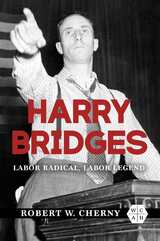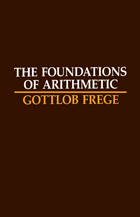
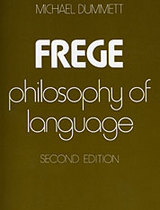
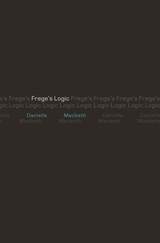
For many philosophers, modern philosophy begins in 1879 with the publication of Gottlob Frege's Begriffsschrift, in which Frege presents the first truly modern logic in his symbolic language, Begriffsschrift, or concept-script. Danielle Macbeth's book, the first full-length study of this language, offers a highly original new reading of Frege's logic based directly on Frege's own two-dimensional notation and his various writings about logic.
Setting out to explain the nature of Frege's logical notation, Macbeth brings clarity not only to Frege's symbolism and its motivation, but also to many other topics central to his philosophy. She develops a uniquely compelling account of Frege's Sinn/Bedeutung distinction, a distinction central to an adequate logical language; and she articulates a novel understanding of concepts, both of what they are and of how their contents are expressed in properly logical language. In her reading, Frege's Begriffsschrift emerges as a powerful and deeply illuminating alternative to the quantificational logic it would later inspire.
The most enlightening examination to date of the developments of Frege's thinking about his logic, this book introduces a new kind of logical language, one that promises surprising insight into a range of issues in metaphysics and epistemology, as well as in the philosophy of logic.
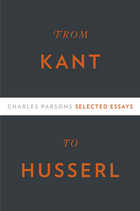
In From Kant to Husserl, Charles Parsons examines a wide range of historical opinion on philosophical questions, from mathematics to phenomenology. Amplifying his early ideas on Kant’s philosophy of arithmetic, Parsons uses Kant’s lectures on metaphysics to explore how his arithmetical concepts relate to the categories. He then turns to early reactions by two immediate successors of Kant, Johann Schultz and Bernard Bolzano, to shed light on disputed questions regarding interpretation of Kant’s philosophy of mathematics. Interested, as well, in what Kant meant by “pure natural science,” Parsons considers the relationship between the first Critique and the Metaphysical Foundations of Natural Science. His commentary on Kant’s Transcendental Aesthetic departs from mathematics to engage the vexed question of what it tells about the meaning of Kant’s transcendental idealism.
Proceeding on to phenomenology, Parsons examines Frege’s evolving idea of extensions, his attitude toward set theory, and his correspondence, particularly exchanges with Russell and Husserl. An essay on Brentano brings out, in the case of judgment, an alternative to the now standard Fregean view of negation, and, on truth, alternatives to the traditional correspondence view that are still discussed today. Ending with the question of why Husserl did not take the “linguistic turn,” a final essay included here marks the only article-length discussion of Husserl Parsons has ever written, despite a long-standing engagement with this philosopher.


Questions of Form was first published in 1989. Minnesota Archive Editions uses digital technology to make long-unavailable books once again accessible, and are published unaltered from the original University of Minnesota Press editions.
In Questions on Form, Joelle Proust traces the concept of the analytic proposition from Kant's development of the notion down to its place in the work of Rudolf Carnap, a founder of logical empiricism and a key figure in contemporary analytic philosophy. Using a method known in France as topique comparative,she provides a rigorous exposition of analyticity, situating it within four major philosophical systems—those of Kant, Bolzano, Frege, and Carnap—and clearly delineating its development from one system to the next.
Proust takes as her point of departure Kant's distinction between analytic and synthetic judgments. Though she makes clear that Kant drew on Locke, Hume, and Leibniz, she argues that his notion of analyticity was innovative, not simply an elaboration of something already found in their work. She shows that the analytic proposition unexpectedly (given its modest status in Kant) came to play an important part in efforts to convert problems considered "transcendental" into questions of belonging to formal logic.
Ultimately, her comparison of their systems reveals that the concept of the analytic, however specific its rile in each, remains linked to a foundationalist strategy—in effect, to the transcendentalist questions Kant used when he reinterpreted the findings of his empiricist predecessors. Hence, this book's provocative claim: today's so-called logical empiricism owes much more to Kant's notion of science than to Hume's.
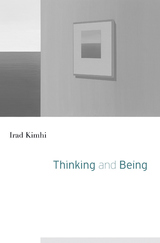
Opposing a long-standing orthodoxy of the Western philosophical tradition running from ancient Greek thought until the late nineteenth century, Frege argued that psychological laws of thought—those that explicate how we in fact think—must be distinguished from logical laws of thought—those that formulate and impose rational requirements on thinking. Logic does not describe how we actually think, but only how we should. Yet by thus sundering the logical from the psychological, Frege was unable to explain certain fundamental logical truths, most notably the psychological version of the law of non-contradiction—that one cannot think a thought and its negation simultaneously.
Irad Kimhi’s Thinking and Being marks a radical break with Frege’s legacy in analytic philosophy, exposing the flaws of his approach and outlining a novel conception of judgment as a two-way capacity. In closing the gap that Frege opened, Kimhi shows that the two principles of non-contradiction—the ontological principle and the psychological principle—are in fact aspects of the very same capacity, differently manifested in thinking and being.
As his argument progresses, Kimhi draws on the insights of historical figures such as Aristotle, Kant, and Wittgenstein to develop highly original accounts of topics that are of central importance to logic and philosophy more generally. Self-consciousness, language, and logic are revealed to be but different sides of the same reality. Ultimately, Kimhi’s work elucidates the essential sameness of thinking and being that has exercised Western philosophy since its inception.

This collection of Michael Dummett’s philosophical essays, spanning more than twenty years, ranges in topic from time to the philosophy of mathematics, but is unified by a steady philosophical outlook. The essays are, in one way or another, informed by Dummett’s concern with metaphysical questions and his belief that the correct approach to them is via the theory of meaning. Reflected here is Dummett’s conviction that the concept of truth is of central importance both for the theory of meaning and for metaphysics. As he sees it, an adequate elucidation of the concept of truth requires nothing less than the construction of a satisfactory theory of meaning. At the same time, resolution of the traditional problems of metaphysics turns critically upon the way in which the concept of truth applies to each of various large ranges of statements, and especially upon whether the statements in each such range satisfy the principle that every statement must be true or false.
The book includes all Dummett’s philosophical essays that were published or given as public lectures before August 1976, with the exception of a few he did not think it worthwhile to reprint and of the two entitled “What Is a Theory of Meaning?” One essay appears here for the first time in English and two have not been previously published. In an extensive preface, Dummett comments on the essays and seeks to relate them to the philosophical background against which they were written.
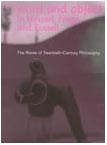
In search of the origins of some of the most fundamental problems that have beset philosophers in English-speaking countries in the past century, Claire Ortiz Hill maintains that philosophers are treating symptoms of ills whose causes lie buried in history. Substantial linguistic hurdles have blocked access to Gottlob Frege's thought and even to Bertrand Russell's work to remedy the problems he found in it. Misleading translations of key concepts like intention, content, presentation, idea, meaning, concept, etc., severed analytic philosophy from its roots.
Hill argues that once linguistic and historical barriers are removed, Edmund Husserl's critical study of Frege's logic in his 1891 Philosophy of Arithmetic provides important insights into issues in philosophy now.
She supports her conclusions with analyses of Frege's, Husserl's, and Russell's works, including Principia Mathematica, and with linguistic analyses of the principal concepts of analytic philosophy. She re-establishes links that existed between English and Continental thought to show Husserl's expertise as a philosopher of mathematics and logic who had been Weierstrass's assistant and had long maintained ties with Cantor, Hilbert, and Zermelo.
READERS
Browse our collection.
PUBLISHERS
See BiblioVault's publisher services.
STUDENT SERVICES
Files for college accessibility offices.
UChicago Accessibility Resources
home | accessibility | search | about | contact us
BiblioVault ® 2001 - 2024
The University of Chicago Press



